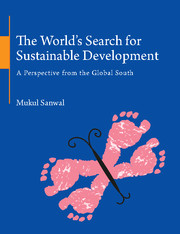Book contents
- Frontmatter
- Dedication
- Contents
- Preface
- Acknowledgments
- Abbreviations
- INTRODUCTION
- 1 Social Dimension of Sustainability
- CONSUMPTION IN AN UNEQUAL WORLD: FRAMING INTERNATIONAL COOPERATION
- CLIMATE POLICY: GLOBAL TO NATIONAL
- SUSTAINABLE DEVELOPMENT: NATIONAL TO GLOBAL
- CONSUMPTION IN A MORE EQUAL WORLD: SHAPING SOCIETAL FUNCTIONS
- GEOPOLITICS TO GEOECONOMICS: RURAL–URBAN DIVIDE, RATHER THAN BETWEEN COUNTRIES
- 21 Urban Areas: Sustainable Development and Human Well-being
- 22 Rural Areas: Climate Change, Fragile States and Human Security
- 23 Global Sustainable Development Goals
- 24 Transformative Impact of the Re-Emergence of China
- THE ASIAN CENTURY
- Index
21 - Urban Areas: Sustainable Development and Human Well-being
from GEOPOLITICS TO GEOECONOMICS: RURAL–URBAN DIVIDE, RATHER THAN BETWEEN COUNTRIES
Published online by Cambridge University Press: 18 December 2015
- Frontmatter
- Dedication
- Contents
- Preface
- Acknowledgments
- Abbreviations
- INTRODUCTION
- 1 Social Dimension of Sustainability
- CONSUMPTION IN AN UNEQUAL WORLD: FRAMING INTERNATIONAL COOPERATION
- CLIMATE POLICY: GLOBAL TO NATIONAL
- SUSTAINABLE DEVELOPMENT: NATIONAL TO GLOBAL
- CONSUMPTION IN A MORE EQUAL WORLD: SHAPING SOCIETAL FUNCTIONS
- GEOPOLITICS TO GEOECONOMICS: RURAL–URBAN DIVIDE, RATHER THAN BETWEEN COUNTRIES
- 21 Urban Areas: Sustainable Development and Human Well-being
- 22 Rural Areas: Climate Change, Fragile States and Human Security
- 23 Global Sustainable Development Goals
- 24 Transformative Impact of the Re-Emergence of China
- THE ASIAN CENTURY
- Index
Summary
Consumption more important than production
How should global governance be organized to support the societal transformation? In a multipolar world, bilateral understandings and regional arrangements have already begun to supplement global multilateral agreements. The overriding issue is not whether the current economic development model can be, and should be, sustained. It is also not just a question of energy, because half of humanity has yet to benefit from industrialization, urbanization and increase in incomes, and they amount to some 5 billion people. As the world continues to urbanize, sustainable development challenges will be increasingly concentrated in cities, particularly in the lower-middle-income countries where the pace of urbanization is fastest’ [UN, 2014]. The unresolved issue is the use and distribution of natural resources. How the integration of these concerns into institutions and review arrangements will supplant or supplement current arrangements with those more suited to the post-industrial, or services and knowledge based, economy and society is now the subject of debate within the United Nations. The economic and power shift to Asia will also shift geopolitics to geoeconomics around the rural–urban divide, rather than between countries and the North–South divide. The overriding issue is how to manage the transformation over the next 20 years, as by then urbanization will be the dominant trend in all countries.
Global sustainable development goals are currently the subject of extensive debate and divergent interpretations, as the scale of global change requires policy choices and trade-offs in the face of conflicting priorities. How global limits are approached will depend on what is regarded as essential for human well-being; as the United Nations has stressed, climate and global environmental change must be fundamentally reframed from a physical into a social problem [ISSC/UNESCO, 2013]. What form global governance structures will take to establish cause-effect relations and transition pathways, it is being suggested, should be based on a meta-science panel [Steven Bernstein et al., 2014] or around a meta-goal for ‘a prosperous, high quality of life that is equitably shared and sustainable’ [ICSU, ISSC, 2015]. In a multipolar world, emerging countries favour policy space for nationally determined action.
- Type
- Chapter
- Information
- The World's Search for Sustainable DevelopmentA Perspective from the Global South, pp. 249 - 261Publisher: Cambridge University PressPrint publication year: 2015
- 1
- Cited by

